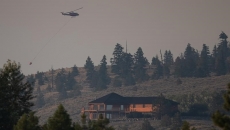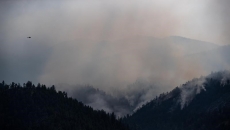Researchers in Vancouver are working to unleash a new weapon they hope will defeat the spread of the virus that causes COVID-19.
The canine scent detection program at Vancouver Coastal Health is expanding to including dogs trained to sniff out COVID-19.
Dogs: Science’s best friend? 🐶🧪
— Vancouver Coastal Health (@VCHhealthcare) August 12, 2021
For over five years, our canine scent detection team – Canines for Care – has been sniffing out Clostridioides difficile. Now the team has added COVID-19 to their scent detection roster!
Read the full story: https://t.co/aCTUl7CXtb pic.twitter.com/5XfjhK2HV4
The program, formed five years ago to detect and reduce cases of the easily spread bacteria C. difficile, has added three new dogs capable of identifying COVID-19.
The two Labrador retrievers, Micro and Yoki, as well as Finn, an English springer spaniel, underwent six months of training and all three are now certified to detect the virus.
A statement from Vancouver Coastal Health says identifying pathogens like the COVID-19 virus or C. difficile bacteria in health-care settings can reduce infection rates and improve quality of care.
Dogs have more than 300 million olfactory receptors, compared with 400 in humans, and the health authority says the finely tuned ability to detect COVID-19 could also make dogs invaluable at airport screening sites, on cruise ships and at public events.
The skills of Micro, Yoki and Finn have been assessed for scent detection by a third party and each was found to have 100 per cent sensitivity in identifying COVID-19 in a laboratory setting, says the health authority.
Dr. Marthe Charles, head of medical microbiology and infection prevention and control at Vancouver Coastal, says the results are exciting and the researchers, dog handlers and dogs are looking forward to the next steps.
“The fact that we're seeing such strong results speaks to the rigour of our training program," Charles says in the release.
"These findings are superior to certain antigen tests available on the market."
Choosing the dogs was also challenging, says Teresa Zurberg, a nationally recognized canine handler, and a canine scent detection specialist.
Researchers worked with teams from around the world to find animals with the right combination of genetics and work potential.
“Every dog can sniff but not every dog can work,” says Zurberg.
The dogs were then exposed to a wide variety of COVID-19 breath, saliva and sweat samples, prepared in a way that removes the risk of transmission from an active virus, protecting the humans and animals involved, says Charles.
Funding from Health Canada is supporting the health authority's ongoing research exploring the signature scent of COVID-19 as well as the development of the dog training program, the release says.
Vancouver Coastal was the first health-care organization in the world to launch a C. difficile canine detection program.
Since 2016, the canine scent detection teams have searched hundreds of hospital areas for C. difficile and visited 32 Canadian health-care facilities to share their infection prevention expertise.






